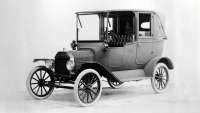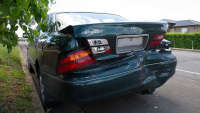There are some small but important differences between buying a house and a car, with the slight cost gap being marginally the most obvious. Another is that we think nothing of buying a property off someone who may still owe thousands, or millions, of dollars on it, because banks paying other banks to close mortgages is just part of the deal.
Buying a car that's subject to finance, however, rings more alarm bells than someone attempting to dance cheek to cheek around the Louvre with the Mona Lisa. It is, of course, just as viable to buy a car subject to finance as it is a house, as long as everything is above board.
So the possibility of a private sale turning into a financing tangle shouldn't put you off; more than four million used cars change hands annually in Australia, and the benefits of buying privately are obvious.
All you really need to do, as with any major purchase, is do your homework beforehand when it comes to finance, just as you would when looking at a car's maintenance issues, service record and so on.
You need to be absolutely sure about a car's financial state, of course, because the onus is on you to do the checking, and if you don't you could be driving into a world of hurt.
What are the potential pitfalls?
As we said in our article on selling financed cars, it all comes down to how car loans work. Because car finance uses the car as security, the loan is applied to the car, not its owner. The owner is still obliged to repay the loan, and until they do any unpaid amount on the loan is held against the car, not the borrower.
This is where it can get a little murky for prospective second-hand buyers. While dealers and auction houses are obliged to provide proof of a clear title – and face stiff penalties for breaching their obligations – private sellers aren't subject to the same regulations.
The big risk of buying a car that has finance attached is that you lose the car
This means that any number of problems can lurk beneath an ostensibly good deal, including hidden interests in the car. If you unwittingly buy a vehicle with money owing against it, you'll get slugged with the debt or lose your car completely when the finance company repossesses it to recoup its losses, as Justine Davies from loan-rating service CANSTAR explains.
"The big risk of buying a car that has finance attached is that you lose the car," she says.
"If that car has been used as security against the loan then the financial institution has ownership rights."
It really is that serious. Australian law dictates that the buyer is responsible for checking the vehicle has a free title; if it all falls apart, you don't have a leg to stand on, but you'll need two to walk everywhere.
You'll either have to pay out the balance of the loan, or the car will be repossessed and sold, leaving you with little more than empty pockets and a lot of time to regret your decisions as you wait for the bus.
How do you avoid the risks?
As long as any finance arrangement is out in the open, there's really no problem with buying a car that's still subject to a loan; it's only when a seller hides the fact that there is still money to be paid that everything goes pear-shaped.
If the seller hasn't advised you that they still owe money on the car, it's a fair indication one of two things is going on. The seller is either purposefully defrauding you or, in a hugely unlikely scenario, simply doesn't know about the car's encumbrance. In either case, it's time to walk away.
Check the Personal Property Securities Register
While this all sounds daunting, there's a simple and cheap way to avoid coming to grief – check the Personal Property Securities Register, or PPSR.
A REVS revolution
The PPSR is the new name for the old-school REVS (Register of Encumbered Vehicles) check, which was outmoded in 2012 (the government version at least, privately run sites like revs.com.au still exist).
The PPSR is a vast, nation-wide register that keeps track of the loans held on Australian cars, motorbikes, boats and anything else of value, even artwork. The older REVS system was a state-by-state concern that only handled vehicles.
"You can visit http://www.ppsr.gov.au to conduct a check using the car's Vehicle Identification Number," Davies explains.
Do your first check at the point that you're considering buying the car
"If your potential car is under finance, the certificate that you receive from doing a Personal Property Securities Register search will detail the type of loan and who holds the loan."
Running a check through the PPSR costs just $2 and gives you concrete proof of the absence or presence of a loan. It's so cheap, in fact, it's worth doing twice.
"Ideally, do your first check at the point that you're considering buying the car," says Davies.
"Do another check on the day of purchase, before you hand over the bank cheque or do the online transfer, just in case the seller has taken out a quick loan in between."
Is it worth buying a financed car?
If you do your due diligence beforehand and deal with an honest seller, there's no reason why buying a car that's still under finance should be any more difficult than buying one with a clear title. It's important, however, to make sure that when you sign your name to the bill of sale, there's no money left owing against the car.
"If you are going to buy a financed car – perhaps, for example, the seller can't pay off their car loan until they have the cash from the sale – then conduct the sale transaction in the office of the financial institution that holds the loan over the car," says Davies.
"That way you can pay for the car, the seller can pay off the loan and you can take unencumbered ownership of the car all at the same time."
It's a lot like attending a real estate agent or a bank to sign the documents for buying a house, only the figures on the papers you're signing are slightly less likely to give you heart palpitations.



.jpg)
.jpg)
.jpg)


.jpg)

.jpg)
 copy.jpg)


.jpg)
.jpg)




.jpg)
.jpg)
Comments